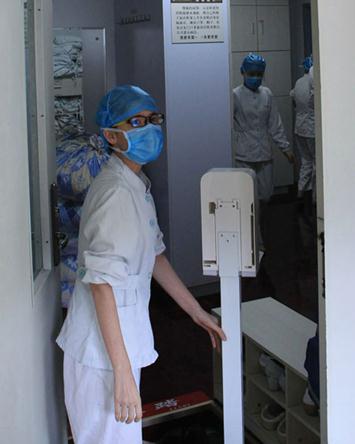
A medical worker transports a device on Thursday at a hospital where a South Korean patient with Middle East respiratory syndrome is quarantined and being treated in Huizhou, Guangdong province. (CHina Daily/Zou Zhongpin)
South Korea urged to provide information on 'epidemic points' to aid in prevention
With tight disease control, the risk of MERS-Middle East respiratory syndrome-being spread in China remains low, although the outbreak in South Korea has been rapidly worsening in the past two weeks, according to the Guangdong provincial Center for Disease Control and Prevention.
A South Korean visitor to Guangdong was confirmed to be the first MERS patient in China on May 29.
South Korea is being urged to provide detailed information about its MERS outbreak as soon as possible in order for Chinese disease control authorities to prevent new imported cases, according to Song Tie, deputy director of the Guangdong CDC.
The 78 people who had close contact with the South Korean MERS patient in Guangdong have all been located, according to the provincial health and family planning commission.
Among them, 75 have been quarantined as of Thursday and none of them has shown any signs of sickness. For the three who have left the province, the commission has notified the countries and regions where they are staying.
The South Korean patient in China is still in a serious condition.
"We've adopted the strictest disease control measures to handle the MERS case, quickly locating the patient and those who had close contact and have put them under close watch. Based on the current monitoring results, it is nearly impossible for new MERS cases to appear in China unless there are new imported ones," Song said.
"But we are concerned about the situation in South Korea. People travel frequently between the two countries for business or travel in large numbers. We hope South Korea can make public as soon as possible the detailed information of its MERS spread, such as where the epidemic points are and whether it has spread to communities," he said.
The number of South Koreans diagnosed with MERS rose to 35 on Thursday, including five tertiary contagions, or third-generation cases, according to South Korea's Health Ministry. The first patient tested positive on May 20.
As of Thursday, three people in South Korea had died of the disease. More than 1,100 schools in the country decided to suspend classes on Thursday.
Anxiety about the MERS outbreak has also spread, with the Korea Tourism Organization reporting on Thursday that more than 4,400 tourists from the Chinese mainland, Hong Kong and Taiwan had canceled their trips to South Korea.
"Sustained human-to-human transmission was rare among previous MERS cases in the Middle East. The tertiary contagions in South Korea are a warning that the virus may have mutated and the infectiousness of MERS may have become stronger," said Li Chufang, an associate researcher at the Guangzhou Institute of Respiratory Disease.
"However, we don't see a big possibility of large-scale human-to-human transmission," he said.
Zhong Nanshan, a renowned respiratory expert, said a massive outbreak of MERS in China was unlikely given a lack of evidence on sustained human-to-human transmission of the virus.
Local officials and doctors have also expressed confidence in controlling the virus, citing experience gained from outbreaks of bird flu and Severe Acute Respiratory Syndrome (SARS).
SARS was first reported in 2002 in Guangdong, which borders Hong Kong. It killed around 800 people in the world. In addition, Guangdong is one of the Chinese provinces that has dealt with the bulk of H7N9 bird flu cases since it emerged in 2013.
MERS is a respiratory illness caused by a coronavirus, similar to SARS. The first human case emerged in Saudi Arabia in 2012. There is no vaccine or treatment for the disease, which has a fatality rate of about 40 percent.
















































